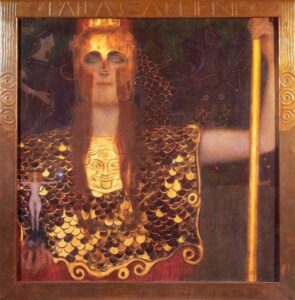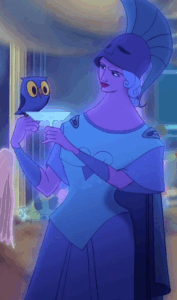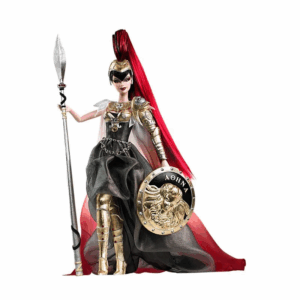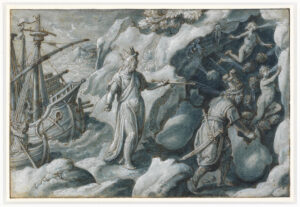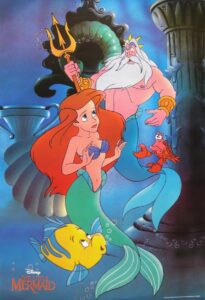From the Dramaturg’s Desk: A Deep Dive into ODYSSEY
Download Complete Print Version
In a book, the characters come to life through a combination of words (the author’s) and imagination (yours). The narration helps readers “see” anything the author can dream up.
When a book is turned into a movie, we see the world of the book through the filmmaker’s eyes. A film uses a lot less words than a book — images do most of the work of storytelling. Think about how many words it would take to describe a complicated five-minute chase scene!
When a composer and librettist work together to make an opera, they think about how music can help the audience “see” the story and characters — from a rowdy bunch of sailors to a fearsome monster to a powerful sorceress. Music can help us feel the characters’ excitement, sadness, fear, anger, or astonishment.
But music isn’t the only tool that opera uses to tell stories. Opera is an Italian word meaning “work,” and there are a lot of people who come together to work on an opera. The librettist writes the story/words. The composer writes the music. The director works with the set designer, costume designer, and lighting designer to imagine the world in which the story will unfold — and then costumers, carpenters, and others get to work to make that world. Meanwhile, the performers begin to rehearse. The director is in charge of the action, while the conductor keeps the music — which can be anything from a single piano to a 100-piece orchestra — on track.

Have you ever wondered how an opera gets made? Keep reading to meet some of the people who worked on this opera and learn more about what inspired them to create a modern riff on this beloved story.
How did you become interested in writing music for the stage?

Both my parents loved to sing and perform with local theater and opera companies while I was growing up. My mom was a mezzo-soprano and performed the famous opera role of Carmen when I was about 9 years old. I was so proud of her and also dazzled by the incredible music. I imagined writing my own opera even then. But it was many years later before I gave it a try.
Do you play any instruments?
Yes. Piano.
What did you study in college?
I majored in fine art and also took all the “pre-med” requirements (I wanted to become a doctor at that point in my life). I also took piano lessons, sang in the choir, and took a course in music theory.
What was your first opera?
Madama Butterfly. I was around 5 years old and my mom was singing the mezzo role called Suzuki.
What is one of your most memorable musical experiences?
In college I was a chorus member in Bach’s “St. Matthew Passion.” I don’t know how wonderful a performance we gave, but for me the experience was overwhelming. I’ve been obsessed with that piece ever since.
What other things are you interested in? Do they influence how you write or what you write about?
I’m a visual artist. I work with oil paints and my favorite subjects include landscapes and scenes of New York City where I live. Painting and composing are very different, of course, but the creative process can feel quite similar.
What advice do you have for young artists?
If you’re passionate about art, music, dance, or theater, then I believe you should pursue your passion while also keeping your options open. Even if your art doesn’t become your main focus, it will definitely enrich your life!
How did you become interested in writing music for the stage?

As a kid, I had my nose in a book for most of my waking hours. (I used to get in trouble in school for reading a book in my lap instead of paying attention during class.) I also loved playing piano and singing. When I landed an internship at Glimmerglass in 1994, I was thrilled to discover an art form that combines my two great loves: storytelling and music.
Do you play any instruments?
I’ve played piano most of my life. I’ve also played flute and organ, and I sang in choirs all through middle school, high school, and college.
What did you study in college?
My undergraduate degree is in piano performance.
What was your first opera?
When I was in junior high, my music teacher was in Carmen and arranged for us to come to a dress rehearsal. I don’t remember much about it, except that she told us that the fake blood (for the fight in the first act) contained peanut butter to make it stick.
What is one of your most memorable musical experiences?
My first summer at Glimmerglass made a huge impression on me. At that point, I was spending hours and hours alone practicing the piano, figuring out what I wanted to express in my performances and honing the technical skills I needed in order to do so. When I got to Glimmerglass, I found myself in rooms full of people — singers, conductors, directors, designers — who had all spent long, lonely hours getting to know a piece, deciding what they wanted to say, and developing the skill and craft to do so. And then, they came together in rehearsals — and changed each other’s minds! Not only did I see singers’ interpretations change, I saw scenery and costumes transformed from one rehearsal to the next, as each team worked together to bring each story to life. I was hooked.
What other things are you interested in? Do they influence how you write or what you write about?
Although I don’t play piano professionally anymore, I still enjoy sitting down at the piano, and my musical knowledge informs my work as a librettist. I also enjoy gardening. When I’m stuck on a writing project, sometimes I need to put down my pencil and pull a few weeds, or take a long walk. When you’re making something, sometimes you need to let your mind roam free.
What advice do you have for young artists?
Take in as much as you can — and not just in your own art form. Read novels and poetry. Go to museums. Find someone to make music with. See plays, operas, films. You never know where your curiosity will lead you!
The ten-year journey of Odysseus from Troy to Ithaca was one of the greatest journeys in history. In fact, the word we use for a journey filled with adventure and hardship — odyssey — comes from the name Odysseus.
For many people, travel is no longer a hardship. While we’re away from home, we can keep in touch with friends and family at home by calling or texting. If we get thirsty or have to use the bathroom, we can always stop at Stewarts; if we get sleepy, we can find a hotel and rest for the night.
Thousands of years ago, when Odysseus left his home in Ithaca to fight a war in Troy, travel was very different. There were no convenience stores, no restaurants, no hotels, no phones. But there was something called the law of hospitality — everyone believed it was their duty and privilege to help any travelers who came their way.
Hospitality was not just a duty, it was a kind of status symbol. Today, a wealthy person might show off by wearing expensive clothes or driving a fancy car. In the ancient world, you showed off by treating strangers extremely well — no matter who they were. In fact, it was considered rude to even ask your guests’ names before offering them food, a bath, and fine new clothes.
Some might say the law of hospitality is no longer relevant in these days when travel is so much more convenient. But plenty of people still face journeys steeped in hardship — fleeing wildfires, extreme weather, even wars in their home countries.
When Odysseus began his journey home at the end of the Trojan War, he expected the trip to last a few weeks, or a couple of months at most — he had good boats and a top-notch crew, and he was one of the smartest captains around. He was also very handsome, and a good storyteller, so people were eager to offer him hospitality along the way. Odysseus was almost perfect, except for one thing — he was full of himself, and that kept getting him into trouble.![]()
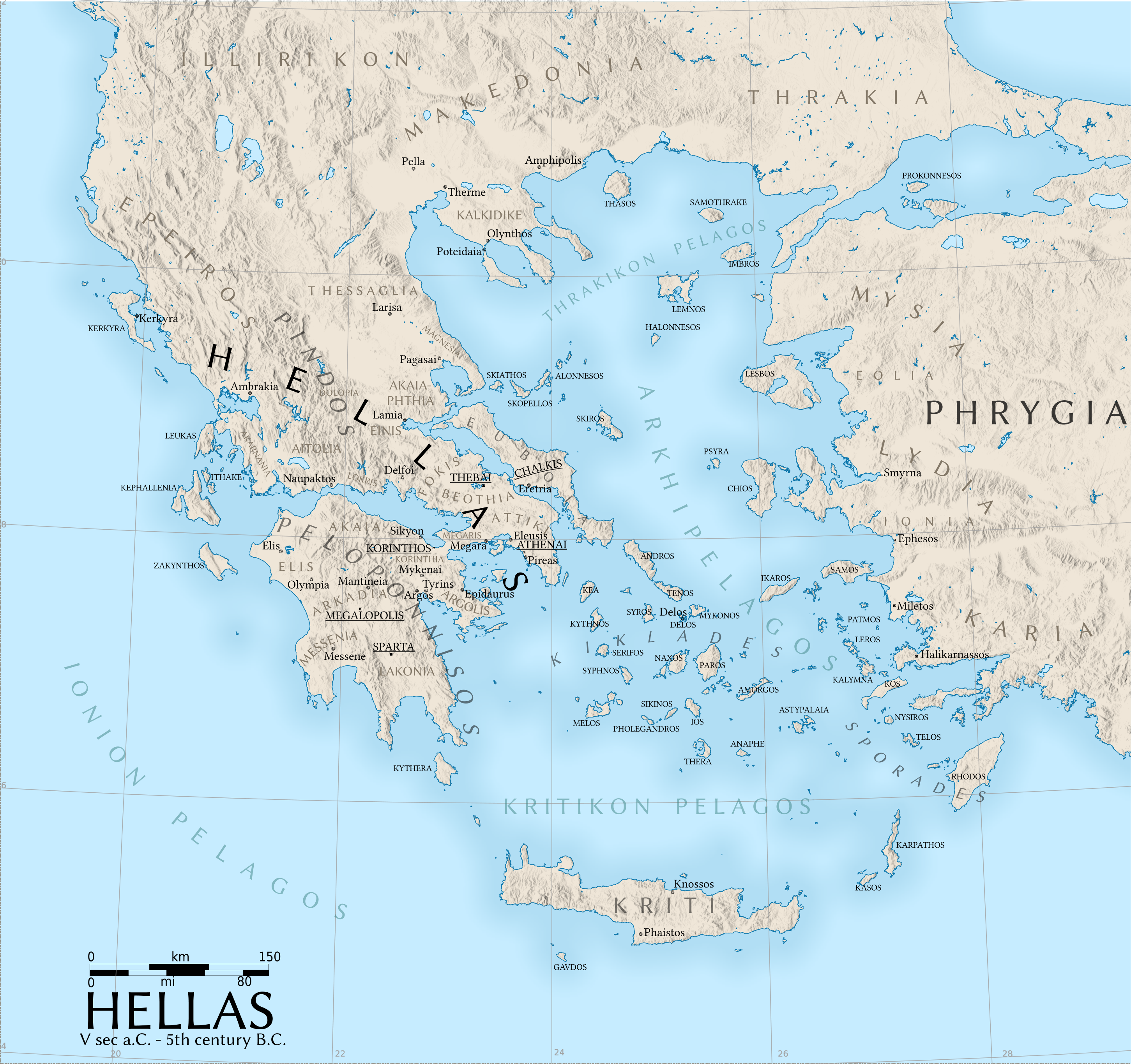 The journey described in The Odyssey doesn’t exactly map onto modern landmarks, but there are clues that allow us to make some informed guesses. In the online syllabus for his Mythology course at University of Pennsylvania, Professor Peter Struck includes an interactive map you can explore. For the most direct route from Troy to Ithaca, here is an alternate route.
The journey described in The Odyssey doesn’t exactly map onto modern landmarks, but there are clues that allow us to make some informed guesses. In the online syllabus for his Mythology course at University of Pennsylvania, Professor Peter Struck includes an interactive map you can explore. For the most direct route from Troy to Ithaca, here is an alternate route.![]()
The Odyssey is an epic poem about an epic journey. The term “epic” comes from the Greek word epikos, which means word or song. The Odyssey is one of the oldest surviving works of literature. It was first written down around the 7th or 8th century B.C.; it was probably performed at festivals for a few hundred years before that. That’s right, performed. Singers called “bards” kept epic poems alive by memorizing them and passing them on to other bards. The Odyssey is around 12,000 lines long — can you imagine memorizing that??
Although The Odyssey has many scenes and characters, it can be summarized in a few lines, which is what Homer does right at the beginning.
“Tell me, O Muse, of that ingenious hero who travelled far and wide after he had sacked the famous town of Troy. Many cities did he visit, and many were the nations with whose manners and customs he was acquainted; moreover he suffered much by sea while trying to save his own life and bring his men safely home; but do what he might he could not save his men, for they perished through their own sheer folly in eating the cattle of the Sun-god Hyperion; so the god prevented them from ever reaching home.” (The Odyssey, Book 1)
Taking their cue from Homer, Ben Moore and Kelley Rourke chose to begin their opera with a summary of the story. They were inspired, in part, by Stephen Sondheim’s choice to begin Sweeney Todd with a choral summary of the musical’s action.
Sing we the song of a famous voyage home,
a voyage with many a twist and turn,
a song of a hero who fought a great war,
then fought even harder to make his return.
A story passed down over thousands of years,
of a hero who battled both men and gods
to return to his kingdom, return to his wife,
to return to himself, against all odds.
A song of a man of twists and turns
a mastermind tactician
who expertly wielded both weapons and words
in single-minded pursuit of his mission.
A song of a couple, divided by war,
but somehow never separate,
whose thoughts of each other were a source of strength,
especially when things got desperate!
Odysseus, King of Ithaca, was away from home for 20 years — ten years to fight the war, plus ten years to get back home. During this time, his wife, Penelope, had to fend off many suitors — men who wanted to marry the Queen of Ithaca so that they could take over the throne of Odysseus.
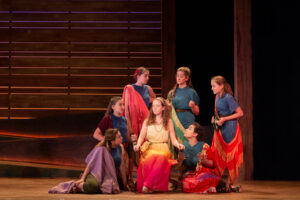 Odysseus was known for being clever, and so was Penelope. She used many strategies to fend off the suitors. There is a famous story about Penelope at her loom. It had been a long time since anyone had heard from Odysseus, and many people, convinced that he was dead, tried to persuade Penelope to choose a new husband. They wouldn’t take no for an answer, so finally Penelope told them that she would choose a husband after she finished weaving a burial shroud for the father of Odysseus. Every day for three years, she worked at her loom to weave the shroud, and every night, she undid her work. (Sneaky!)
Odysseus was known for being clever, and so was Penelope. She used many strategies to fend off the suitors. There is a famous story about Penelope at her loom. It had been a long time since anyone had heard from Odysseus, and many people, convinced that he was dead, tried to persuade Penelope to choose a new husband. They wouldn’t take no for an answer, so finally Penelope told them that she would choose a husband after she finished weaving a burial shroud for the father of Odysseus. Every day for three years, she worked at her loom to weave the shroud, and every night, she undid her work. (Sneaky!)
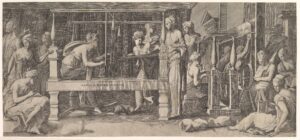
“I was driven thence by foul winds for a space of nine days upon the sea, but on the tenth day we reached the land of the Lotus-eaters, who live on a food that comes from a kind of flower. Here we landed to take in fresh water, and our crews got their mid-day meal on the shore near the ships. When they had eaten and drunk, I sent two of my company to see what manner of men the people of the place might be, and they had a third man under them. They started at once, and went about among the Lotus-eaters, who did them no hurt, but gave them to eat of the lotus, which was so delicious that those who ate of it left off caring about home, and did not even want to go back and say what had happened to them, but were for staying and munching lotus with the Lotus-eaters without thinking further of their return; nevertheless, though they wept bitterly I forced them back to the ships and made them fast under the benches. Then I told the rest to go on board at once, lest any of them should taste of the lotus and leave off wanting to get home, so they took their places and smote the grey sea with their oars.” (The Odyssey, Book 9)
This episode in The Odyssey, in which the crew of Ithacan soldiers consume intoxicating lotus fruits and become distracted from their duty and purpose, has inspired artists of all kinds. The Lotos-eaters, a poem by Alfred, Lord Tennyson, is a mediation on the dueling desires for rest and responsibility. R.E.M.’s Lotus is sung from the point of view of someone who has consumed the fabled fruit. The Lotus Club, a private social club in NYC, took its name from Tennyson’s poem, which also supplies the club’s motto: “In the afternoon they came upon a land in which it seemed always afternoon.”
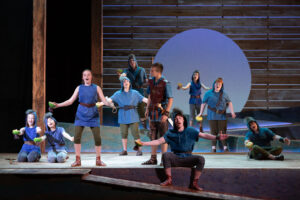
Here upon these fragrant shores,
life is so relaxing.
Furl the sails and stow the oars
‘cause odysseys are taxing.
Open up your eyes and notice
sun and sand and flowers.
Taste, o taste the honeyed lotus.
I could eat this fruit for hours.

Athena is the goddess of wisdom, war and defense, weaving, pottery, and crafts. She’s associated with the owl, a wise creature. She carries a shield and spear, and she wears an aegis — a snakeskin cape adorned with the head of Medusa. Athena offered special protection and advice to Odysseus during his long journey home.
Once, to see who would win rule over the Greek city now known as Athens, Poseidon and Athena both produced gifts: Poseidon offered a horse, and Athena planted the first olive tree. Athena won this contest, and she named the city after herself.
|
|
|
|
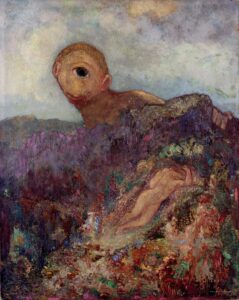
“Now the Cyclopes neither plant nor plough, but trust in providence, and live on such wheat, barley, and grapes as grow wild without any kind of tillage, and their wild grapes yield them wine as the sun and the rain may grow them. They have no laws nor assemblies of the people, but live in caves on the tops of high mountains; each is lord and master in his family, and they take no account of their neighbours.” (The Odyssey, Book 9)
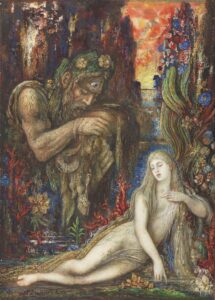
On the island of the Cyclops, Odysseus and his crew are trapped by a cyclops named Polyphemus, the son of the god Poseidon. Crafty Odysseus offered wine — a lot of it! — to the monster. When Polyphemus was drunkenly asleep, Odysseus and his men stuck a burning olive stake into the Cyclops’ eye, blinding him. As Odysseus and his men escaped, the Cyclops called out to his father, Poseidon: “If I am indeed your son, grant that Odysseus may never reach his home alive; or if he must get back to his friends, let him do so late and in misery.”
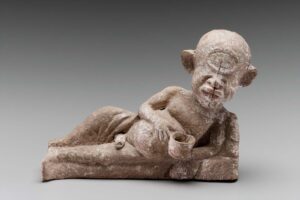
“Aeolus entertained me for a whole month… When I said I must go, and asked him to further me on my way, he made no sort of difficulty, but set about doing so at once. Moreover, he flayed me a prime ox-hide to hold the ways of the roaring winds, which he shut up in the hide as in a sack — for Jove had made him captain over the winds, and he could stir or still each one of them according to his own pleasure. He put the sack in the ship and bound the mouth so tightly with a silver thread that not even a breath of a side-wind could blow from any quarter. The West wind, which was fair for us, did he alone let blow as it chose.” (The Odyssey, Book 10)

Aeolus is one of many sky-gods in Ancient Greek mythology. His specific focus is storm winds, which he keeps safe inside the caverns of his island, Aeolia. These winds take the form of horses, which is why Aeolus is also known as Hippotades, “the reiner of horses.” The aeolian harp, a stringed instrument played by wind, is named for Aeolus. Check out this homemade aeolian harp, then see and hear this massive sculpture, Aeolus. It’s a functioning aeolian harp tuned in Aeolian mode!
|
|
|

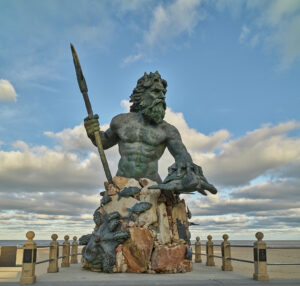

|
|
|
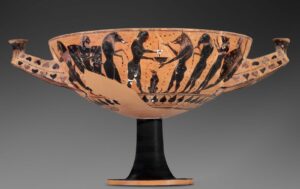
Daughter of Helios and Perse, Circe is a sorceress said to live on the island of Aeaea, where she is surrounded by animals and lush vegetation that she uses to concoct her potions. When Odysseus and his crew arrive on Circe’s island, she invites them to dine in her home. Using sorcery, Circe transforms the crew to pigs, but spares Odysseus. A year later, she releases the crew from their spell and allows them to depart.
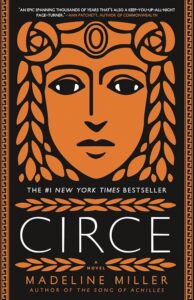
Circe is often depicted in artistic renderings with her potions, as well as her staff, animals, or vegetation nearby.
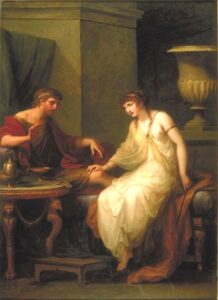
While she is often depicted as a seductress, a controller and trapper of men, Circe is also one of the most helpful people to Odysseus in the course of the epic, telling him how to successfully enter the Underworld in order to learn how to appease the gods and return home safely.
“Why does this story want to be an opera?” This is one of the first questions opera makers ask themselves. Why not just a book? Or a play? Or a movie? When Kelley and Ben were choosing scenes from The Odyssey for their opera, they looked for stories that offered a variety of musical moods. The story of the Sirens — known for their irresistible song — was the perfect excuse for some glorious music.
“First you will come to the Sirens, who enchant all who come near them. If any one unwarily draws in too close and hears the singing of the Sirens, his wife and children will never welcome him home again, for they sit in a green field and warble him to death with the sweetness of their song. There is a great heap of dead men’s bones lying all around, with the flesh still rotting off them. Therefore pass these Sirens by, and stop your men’s ears with wax that none of them may hear; but if you like you can listen yourself, for you may get the men to bind you as you stand upright on a cross piece half way up the mast, and they must lash the rope’s ends to the mast itself, that you may have the pleasure of listening. If you beg and pray the men to unloose you, then they must bind you faster.” (The Odyssey, Book 7)
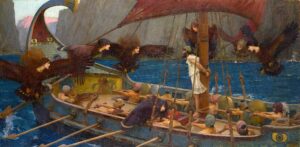
In ancient times, travel by sea was extremely dangerous. The mythological Sirens offered one explanation as to how or why sailors crashed or disappeared on ocean voyages.
Depictions of the Sirens have evolved over time. In ancient Greek culture, they were thought to be bird-like, with feathers and wings, despite their association with sailors and the sea. Beginning in the Middle Ages, they were more likely to be part fish, like a mermaid. Whether decked out in feathers or fins, a Siren’s most important attribute is her otherworldly voice.
Fun fact: In the opera Tosca, when the title character successfully charms her boyfriend with a song, he calls her “mia sirena,” which means “my siren.”
Odysseus was known for his hubris, a word that means “excessive pride or self-confidence.” Hubris led Odysseus to mock the Cyclops, taunt Poseidon, and risk hearing the song of the Sirens. Because of his hubris, his journey home was longer — and more dangerous — than it needed to be. When Odysseus finally reached Ithaca, he looked more like a beggar than the mighty warrior King he once was. When a man began to insult Odysseus, the old king did not reveal his identity, but instead shared what he had learned on his long, difficult voyage home. In our opera, this “lesson” is transformed into a quartet for Athena, Poseidon, and the two Bards.
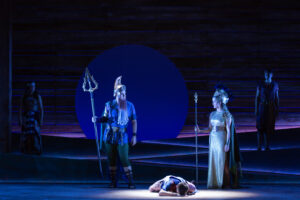 |
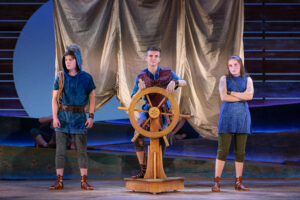 |
“Of all the creatures that breathe and move on Earth, there is none as powerless as man. As long as the gods grant him success and strength, he thinks he will never know future suffering. Yet when the blessed gods instead bring trouble on him, he must endure the pain with whatever patience he can. Men’s spirits on this Earth depend on the fate the Father of gods and men decrees. I too once had a measure of prosperity among men, but I was seduced by strength and power to many wanton acts, relying on my father and my brothers to help me. Let me be a lesson to men not to be lawless, but to enjoy the gifts of the gods in peace.” (The Odyssey, Book 18)
A man’s the feeble-est, foolish-est creature that ever walked the earth.
He thinks himself invincible. He exaggerates his worth.
But hard times come to one and all to test our mind and mood.
Green leaves turn to gold and fall, and feasters turn to food.
On the battlefield, on the raging seas, I fought, I plundered, I laughed.
Now I’ve lost my ship, and I’ve lost my men, my riches all turned to rags.
For weeks, or months, or even years, a man might beat the odds.
But if he’s wise, he learns to accept whatever comes from the gods.
“Penelope said, ‘Listen to me you suitors, who persist in abusing the hospitality of this house because its owner has been long absent, and without other pretext than that you want to marry me; this, then, being the prize that you are contending for, I will bring out the mighty bow of Ulysses, and whomsoever of you shall string it most easily and send his arrow through each one of twelve axes, him will I follow and quit this house of my lawful husband, so goodly, and so abounding in wealth. But even so I doubt not that I shall remember it in my dreams.’” (The Odyssey, Book 21)

“Ulysses, when he had taken it up and examined it all over, strung it as easily as a skilled bard strings a new peg of his lyre and makes the twisted gut fast at both ends. Then he took it in his right hand to prove the string, and it sang sweetly under his touch like the twittering of a swallow. The suitors were dismayed, and turned colour as they heard it; at that moment, moreover, Jove thundered loudly as a sign, and the heart of Ulysses rejoiced as he heard the omen that the son of scheming Saturn had sent him.” (The Odyssey, Book 21)
Kelley and Ben worked together to choose the scenes from The Odyssey to include in their opera. Kelley also combed through the epic for phrases and verses that might provide starting points for songs. In The Odyssey, Homer uses the metaphor of a shipwrecked sailor to describe Odysseus and Penelope’s joy when they are finally reunited. Kelley borrowed this metaphor for “Shipwrecked Sailor,” a song we hear when Penelope and Odysseus think of each other.
“As the sight of land is welcome to men who are swimming towards the shore, when Neptune has wrecked their ship with the fury of his winds and waves; a few alone reach the land, and these, covered with brine, are thankful when they find themselves on firm ground and out of danger — even so was her husband welcome to her as she looked upon him, and she could not tear her two fair arms from about his neck.” (The Odyssey, Book 23)
Like a shipwrecked sailor catching sight of land
as he fights against the salty sea
I will weep for joy the day I touch your hand
You’re my love, you’re my home, you’re the world to me.
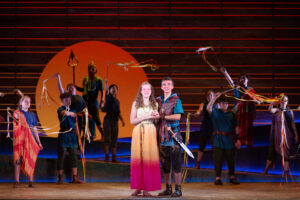
Who lives in a pineapple under the sea? Odysseus! The SpongeBob SquarePants Movie (2004) sets SpongeBob and Patrick on an Odyssey-inspired adventure. Don’t believe us? Check out the parallels between the film and Homer’s epic in this article from Collider. Stream the movie on Paramount+.
A Voyage Down South: O Brother, Where Art Thou? (2000) sets Homer’s Odyssey in 1937 Mississippi with a soundtrack of bluegrass, country, and Southern folk music. Three convicts escape jail to prevent Ulysseus’s wife from remarrying. Along the way they’re seduced by Sirens and fight a one-eyed Bible salesman “Cyclops.” George Clooney won a Golden Globe Award for his performance as Ulysseus (the Latin translation of Odysseus), and the film’s soundtrack won the 2002 Grammy Award for Album of the Year. You can rent the movie on Apple TV+ and Amazon.
Homer Meets Homer: Homer Simpson stars as Odysseus in “D’oh, Brother Where Art Thou?” from The Simpsons episode “Tales from the Public Domain.” Homer successfully delivers the Trojan horse to end the war, but fails to make a sacrifice to the gods, angering them. Homer’s meandering voyage home to his wife Penelope (Marge) and his son Telemachus (Bart) includes encounters with the Sirens (Patty and Selma) and Circe, and crossing the River Styx.
Give Odysseus a bone! The PBS kids’ series Wishbone featured a Jack Russell Terrier who dreams of starring in his favorite literary classics. When Wishbone is captured at the local park, he imagines himself as Odysseus trying to make his way home. You can watch the full episode, “Homer, Sweet Homer,” on YouTube. (The Odyssey portion starts about 15 minutes in.)
Odysseus Wins an Emmy: NBC’s 1997 two-part special The Odyssey featured an all-star cast, including Bernadette Peters as Circe (who will perform at the Festival this summer!). The series won an Emmy Award for Outstanding Directing. You can watch Part 1 here on YouTube.
Rock on, Odysseus! Fusing heavy metal and progressive rock, the band Symphony X recorded a 24-minute telling of Odyssey in 2005. Featured characters (apart from Odysseus) include the Sirens, Circe, Scylla, and Charybdis. The full album ranks 5th on Loudwire’s list of the Top 25 Power Metal Albums of All Time.
From TikTok to the Billboard Charts: EPIC: The Musical retells the Odyssey through nine albums of original music. The first album, The Troy Saga, reached #2 on the Billboard US Cast Album Chart, second only to Hamilton. Like Lin-Manuel Miranda with In the Heights, the show’s creator, Jorge Rivera-Herrans, began working on the show while a student in college.
The Artist Formerly Known as… Odysseus? When Prince shifted from commercial music to performance art, his first project was a musical adaptation of Odyssey featuring 13 new songs. No cast recording was ever made, but there are audio and video clips floating around online.
Odyssey Gets Groovy: Odysseus and the Sirens get a psychedelic rock treatment in the song “Tales of Brave Ulysses” by British band Cream.
Ohio rapper TINO released a trilogy of tracks inspired by Odyssey. Click to listen to Part 1, Part 2, and Part 3.
This version is graphic — a graphic novel, that is! Enjoy Odyssey through the beautiful illustrations by Gareth Hinds in his graphic novel, a New York Times best-seller.
A Book for a Spell: Madeline Miller’s award-winning novel Circe gives backstory to the titular sorceress and goddess, casting her as the hero of her own story. When Zeus discovers Circe has the power of witchcraft, he banishes her to a deserted island. Confronted by the gods (not to mention mythical beasts and Odysseus, too), she must choose whether to live among mortals or return to the realm of the gods.
Penelope’s Turn: Released only a year ago, The Last Song of Penelope by Claire North imagines an Odyssey where Odysseus’s return is not a happy homecoming, but rather the start of a bloody civil war for Penelope’s hand. It’s the last book in North’s Songs of Penelope trilogy, which explores Penelope’s side of the Trojan War.
The novel Ulysses by James Joyce (1922) is a modernist adaptation of The Odyssey. Also adapted to the stage and screen, the story follows the ordinary adventures of Leopold Bloom and Stephen Dedalus on the day June 16, 1904 as they traverse through Dublin, Ireland. The chapters of Ulysses are named for events, locations, and characters in The Odyssey, and each take a different narrative and stylistic approach to interpreting their title.
The Odyssey, by Gillian Cross, with illustrations by Neil Packer, begins before the beginning, giving us a snapshot of Odysseus’ years in Troy before turning to his journey home. The highlights of the journey are relayed chronologically, in simple language, perfect for reading aloud (over several sittings). Illustrations are plentiful and stunning in this large-scale, hardbound book.
The three-volume Tales from the Odyssey, by Mary Pope Osborn also begins with the Trojan War and proceeds chronologically, in kid-friendly prose. The pocket-sized paperback books are laid out in chapters, with a small black-and-white drawing at the beginning of each.
“Now that all the others have run out of air, it’s my turn to do a little storytelling.” The Penelopiad, by Margarget Atwood, offers a female perspective on the return of Odysseus, combining Penelope’s reminiscences with those of twelve murdered maids.
Old-school point-and-click video games are back with The Odyssey HD. Help Odysseus get back home to Persephone and Telemachus by blinding the Cyclops, facing Circe, avoiding the Sirens, and more. For extra nostalgia, play it on your computer, or take it with you on a variety of mobile platforms.
Long before Nintendo, Xbox, and Playstation was the Commodore 64. It’s the best-selling home computer of all time, and one of its games was The Odyssey. The game had 11 chapters, one for each year Odysseus spent away, plus one more “year” dedicated to fighting Penelope’s suitors. You can watch gameplay of it here on YouTube.
If you loved the Odyssey-inspired episode of Wishbone above, you may want to play Wishbone and the Amazing Odyssey! Wishbone is helping a virtual library use a new tool that allows you to enter the worlds of your favorite stories. One big problem: Once Wishbone chooses Odyssey, he gets stuck in the story! In order to escape, he has to retrace Odysseus’s steps. Originally a CD-ROM game from 1996, you can now play online for free at ClassicReload.com.
An Odyssey game where you don’t play as Odysseus? It exists! In Odyssey: The Search for Ulysses, you play as Heritias, a prisoner in Ithaca set free by Penelope to find Odysseus. Novel for its time, the game had multiple ways to reach Odysseus, and your decisions would impact how the game played out. You can watch gameplay of it on YouTube, including one player’s “dark path” to Odysseus. The soundtrack by composer Gilles Sivilotto is available to stream and purchase on Bandcamp.

